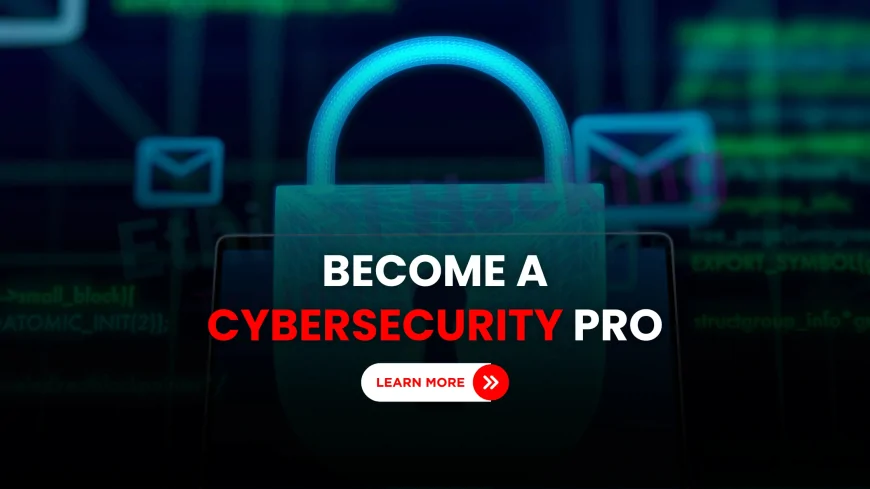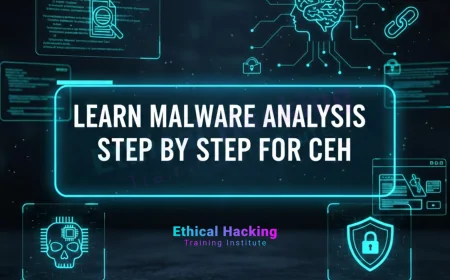Top Hacking Courses You Should Take to Become a Cybersecurity Expert | Top Ethical Hacking Programs to Become a Cybersecurity Professional
Discover top hacking courses and certifications to launch your cybersecurity career. Learn ethical hacking, penetration testing, and more.

Table of Contents
- Introduction
- Why Learn Ethical Hacking?
- Skills You Need to Start Hacking
- Top Hacking Courses to Take
- Top Hacking Certifications
- Career Paths in Cybersecurity
- Online vs Offline Learning
- Comparison Table of Top Courses
- Tips to Succeed in Hacking Courses
- Free vs Paid Courses
- Importance of Labs and Internships
- Popular Tools Taught in Courses
- Suggested Learning Path for Beginners
- Job Opportunities After Completing Courses
- Salary Expectations in Cybersecurity
- Global Demand for Ethical Hackers
- Why Continuous Learning is Crucial
- FAQs
- Conclusion
Introduction
- As technology advances, cybersecurity threats continue to grow in complexity and frequency.Ethical hacking has emerged as a critical skill to safeguard systems, networks, and data. Whether you're just beginning or seeking to upgrade your knowledge, taking the right hacking courses can launch your cybersecurity career and position you as a top-tier expert.
Why Learn Ethical Hacking?
- Growing demand for cybersecurity professionals globally
- Attractive salaries and career advancement
- Opportunities to work in top organizations, including government agencies
- The thrill of thinking like a hacker—but ethically
- Contributing to a safer digital ecosystem
Skills You Need to Start Hacking
- Basic knowledge of networking (TCP/IP, DNS, etc.)
- Understanding of operating systems (Linux/Windows)
- Familiarity with programming or scripting languages (Python, Bash)
- Problem-solving and analytical mindset
- Passion for security and curiosity to explore
Top Hacking Courses to Take
- Certified Ethical Hacker (CEH) by EC-Council
-
Offensive Security’s PWK Course: Mastering Penetration Testing with Kali Linux (OSCP)
-
Practical Ethical Hacking – TCM Security
-
Web Application Hacking and Security – PortSwigger
-
Red Team Ops – Zero-Point Security
-
Bug Bounty Hunting – HackerOne & Bugcrowd
- TryHackMe and Hack The Box (Lab-based learning)
Top Hacking Certifications
- CEH – Certified Ethical Hacker
- OSCP – Offensive Security Certified Professional
- CompTIA Security+ and PenTest+
- eJPT – Junior Penetration Tester
- CISSP – Certified Information Systems Security Professional
- eCPPT – eLearnSecurity Certified Professional Penetration Tester
Career Paths in Cybersecurity
- Ethical Hacker / Penetration Tester
- Red Team Operator
- Cybersecurity Analyst
- Security Consultant
- Forensic Investigator
- Security Engineer / Architect
Online vs Offline Learning
Online Courses: Flexible, affordable, and accessible from anywhere.
Offline Courses: Offer real-time interaction and in-person mentorship.
Comparison Table of Top Courses
| Course | Provider | Difficulty | Best For |
|---|---|---|---|
| CEH | EC-Council | Intermediate | Ethical hacking fundamentals |
| OSCP | Offensive Security | Advanced | Hands-on penetration testing |
| eJPT | INE/eLearnSecurity | Beginner | Intro to ethical hacking |
| TryHackMe | TryHackMe | Beginner to Advanced | Lab-based learning |
Tips to Succeed in Hacking Courses
- Practice daily using real-world labs
- Join forums and communities (Reddit, Discord, LinkedIn)
- Use virtualization tools to build a hands-on security lab featuring Kali Linux and other hacking utilities.
- Participate in bug bounty programs to gain practical, real-world cybersecurity experience.
- Stay updated with the latest vulnerabilities (CVE database)
Free vs Paid Courses
Free Platforms: TryHackMe (some rooms), Cybrary, OpenSecurityTraining, YouTube tutorials.
Paid Courses: Often structured with certification, mentorship, and lab access. Recommended for serious learners.
Importance of Labs and Internships
Hands-on practice is the foundation of hacking. Labs and internships help you:
- Apply theoretical concepts in real-world scenarios
- Build a portfolio to showcase your skills
- Gain experience that employers trust
Popular Tools Taught in Courses
- Metasploit Framework
- Nmap, Wireshark
- Burp Suite
- John the Ripper, Hydra
- Aircrack-ng
- Recon-ng, Nikto
- Kali Linux and Parrot OS environments
Suggested Learning Path for Beginners
- Start with Networking & Linux basics
- Learn Python or Bash scripting
- Take beginner-friendly courses like eJPT or TryHackMe
- Advance to CEH or CompTIA Security+
- Move to OSCP or Bug Bounty programs
Job Opportunities After Completing Courses
- Security Analyst
- Penetration Tester
- Threat Intelligence Analyst
- Bug Bounty Researcher
- Cybersecurity Consultant
Salary Expectations in Cybersecurity
- India: ₹5 LPA – ₹25 LPA
- USA: $70,000 – $150,000 per year
- UK: £35,000 – £90,000 per year
Global Demand for Ethical Hackers
The global cybersecurity talent gap is expected to exceed 3.5 million jobs by 2025, as reported by Cybersecurity Ventures. Certified ethical hackers are in massive demand across sectors including finance, healthcare, IT, and defense.
Why Continuous Learning is Crucial
Hackers evolve their techniques daily. To remain effective as a cybersecurity expert, staying current with tools, technologies, and threats is non-negotiable. Regular learning through blogs, courses, and conferences is essential.
Frequently Asked Questions (FAQs)
1. What is the best ethical hacking course for beginners?
TryHackMe and eJPT are great starting points for beginners in ethical hacking.
2. Is CEH worth it in 2025?
Yes, CEH remains one of the most respected foundational certifications in cybersecurity.
3. Can I learn hacking for free?
Yes, platforms like Cybrary, YouTube, and free rooms on TryHackMe offer quality content.
4. Is OSCP harder than CEH?
Yes, OSCP is more advanced and hands-on compared to CEH, which is theory-heavy.
5. How long does it take to become an ethical hacker?
With consistent learning, you can start applying for jobs within 6–12 months.
6. Do I need a degree to become a hacker?
No, skills and certifications often matter more than formal degrees in this field.
7. What tools should I learn as a beginner?
Start with Nmap, Wireshark, Burp Suite, and Linux commands.
8. How much can I earn as an ethical hacker?
Salaries range from ₹5 LPA in India to over $150,000 in the US for experienced hackers.
9. Is Python necessary for ethical hacking?
Python is very useful for scripting, automation, and exploit development.
10. Are there internships in ethical hacking?
Yes, many firms offer internships. Labs and bug bounties can also act as practical experience.
11. Which is better – CEH or CompTIA Security+?
Both are good. CEH is more focused on hacking, while Security+ covers broader cybersecurity topics.
12. What is a bug bounty program?
A program where companies reward hackers for finding and reporting vulnerabilities.
13. Can I get a job with just CEH?
Yes, CEH is often enough for entry-level roles, especially with hands-on practice.
14. Do these courses teach mobile and IoT hacking?
Yes, advanced courses like CEH v13 and OSCP include IoT, web, and mobile platforms.
15. What is Red Team training?
Red Team training simulates real-world attacks to test organizational defenses.
16. Are hacking courses legal?
Yes, as long as they’re used for ethical and professional purposes.
17. What is the difference between hacking and ethical hacking?
Ethical hacking is legal and aims to improve security; hacking without permission is illegal.
18. Which companies hire ethical hackers?
Google, Microsoft, IBM, Deloitte, PwC, government agencies, and more.
19. Do I need to be good at math?
Not necessarily. Logical thinking is more important than complex math in ethical hacking.
20. What is the future of ethical hacking?
Bright and growing! With rising cyber threats, ethical hackers are in high demand globally.
Conclusion
Cybersecurity is one of the most exciting, rewarding, and rapidly growing fields in tech. Taking the right hacking courses not only builds your technical expertise but also opens doors to elite career opportunities. Whether you start with CEH or explore hands-on labs through TryHackMe, every step brings you closer to becoming a true cybersecurity expert. Invest in learning, practice consistently, and you'll be a formidable defender in the digital world.
What's Your Reaction?
 Like
0
Like
0
 Dislike
0
Dislike
0
 Love
0
Love
0
 Funny
0
Funny
0
 Angry
0
Angry
0
 Sad
0
Sad
0
 Wow
0
Wow
0

















